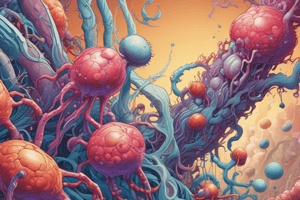Podcast
Questions and Answers
What is the role of agricultural practices in the emergence of antibiotic resistance?
What is the role of agricultural practices in the emergence of antibiotic resistance?
- Antibiotics used as growth promoters for intensive animal farming (correct)
- Antibiotics are naturally present in soil due to farming practices
- Antibiotics are used to enhance the growth of crops
- Agricultural practices have no impact on antibiotic resistance
What did a survey of beef and poultry sold in U.S. supermarkets find?
What did a survey of beef and poultry sold in U.S. supermarkets find?
- Low levels of antibiotic-resistant bacteria
- No antibiotic residues in the meat products
- Presence of organic labeling on all products
- Relatively high levels of antibiotic-resistant bacteria (correct)
Why can products from animals treated with antibiotics not be labeled as organic?
Why can products from animals treated with antibiotics not be labeled as organic?
- Antibiotics increase the shelf life of the products
- Antibiotic use contradicts organic farming standards (correct)
- Antibiotics alter the genetic makeup of the animals
- Organic labeling is not regulated for animal products
What are antibiotics?
What are antibiotics?
What is the main focus of immunisation in the context of antibiotics?
What is the main focus of immunisation in the context of antibiotics?
What is the significance of antibiotic-resistant strains of Salmonella being isolated from minced beef?
What is the significance of antibiotic-resistant strains of Salmonella being isolated from minced beef?
What is the primary mechanism of action of antibiotics?
What is the primary mechanism of action of antibiotics?
What is the reason behind the control against antibiotic resistance?
What is the reason behind the control against antibiotic resistance?
What is the purpose of the genetic code in the context of antibiotics?
What is the purpose of the genetic code in the context of antibiotics?
What is the impact of genetic exchange on antibiotic resistance?
What is the impact of genetic exchange on antibiotic resistance?
What is the goal of protein synthesis in the context of antibiotics?
What is the goal of protein synthesis in the context of antibiotics?
How do antibiotics contribute to the development of antibiotic resistance?
How do antibiotics contribute to the development of antibiotic resistance?
What are the mechanisms of action for antibiotics?
What are the mechanisms of action for antibiotics?
How can antibiotic resistance be acquired?
How can antibiotic resistance be acquired?
What can plasmid-mediated antibiotic resistance lead to?
What can plasmid-mediated antibiotic resistance lead to?
How does antibiotic misuse contribute to antibiotic resistance?
How does antibiotic misuse contribute to antibiotic resistance?
What percentage of antibiotic prescriptions are considered unnecessary?
What percentage of antibiotic prescriptions are considered unnecessary?
What is crucial in preventing human and animal infections?
What is crucial in preventing human and animal infections?
What is the primary method for controlling antibiotic resistance?
What is the primary method for controlling antibiotic resistance?
What do vaccines induce to prevent infectious diseases?
What do vaccines induce to prevent infectious diseases?
How can antibiotic resistance be acquired at the cellular level?
How can antibiotic resistance be acquired at the cellular level?
What is the role of antibiotics in inhibiting or killing microorganisms?
What is the role of antibiotics in inhibiting or killing microorganisms?
What can antibiotic resistance be acquired through?
What can antibiotic resistance be acquired through?
Study Notes
Antibiotic Resistance and Mechanisms of Action
- A 12-year-old boy acquired a ceftriaxone-resistant Salmonella strain from cattle treated with the drug
- Antibiotics are metabolic products of microorganisms that inhibit or kill other microorganisms
- Mechanisms of action for antibiotics include cell wall active agents, inhibition of nucleic acid synthesis, and inhibition of protein synthesis
- Antibiotic resistance is inevitable due to bio-evolution, and can be acquired through mutations on the chromosome or plasmid
- Plasmid-mediated antibiotic resistance can lead to high-level resistance and is easily transferable to other species
- Acquired antibiotic resistance can occur through mutation, transformation/transposition, or conjugation
- Mechanisms of antibacterial resistance include producing enzymes to inactivate or destroy the drug, altering the drug's target, and preventing entry or efflux of the drug from the cell
- Antibiotic misuse creates a favorable environment for antibiotic-resistant organisms to thrive
- One-third of antibiotic prescriptions are unnecessary, contributing to antibiotic resistance
- Control of antibiotic resistance involves prescription restrictions, rotation, reducing animal use, expertise, surveillance, infection control, and immunization
- Immunization is crucial in preventing human and animal infections, involving vaccines such as live, killed, toxoid, and subunit vaccines
- Vaccines induce immunity to prevent infectious diseases and can be administered through vaccination, including live, killed, toxoid, and subunit vaccines
Studying That Suits You
Use AI to generate personalized quizzes and flashcards to suit your learning preferences.
Related Documents
Description
Test your knowledge of antibiotic resistance and mechanisms of action with this quiz. Explore the causes and mechanisms of antibiotic resistance, the impact of antibiotic misuse, and strategies for controlling resistance. Also, learn about the importance of immunization in preventing infectious diseases.




